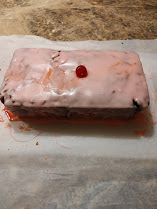From Anne
Montgomery
There
was nothing extraordinary about the cat that stared at me from the pages of my
local newspaper. He was black. Gold eyes. His name was Westin. He’d been at the
Humane Society way too long. His $20 price tag a clear indication that if he
did not find a home soon, well…
I
called my son to come look at the picture. I told him about
Westin. “Should we go get him?” I asked. His eyes lit up.
Within
the hour we bounded through the door at the shelter, waving the newspaper
article. “We’re here for Westin.” We grinned at the receptionist. A woman
standing nearby frowned. I pointed at the picture again, wondering at her odd
reaction.
“The
story did not tell you everything,” she said, leading us toward a glassed-in
enclosure, a place called the Campus for Compassion, where hard-to-adopt
animals are placed for one last push to find them a forever home.
My son
and I glimpsed Westin briefly through a large window as the woman ushered us
through a doorway, around a corner, and through another door. We somehow
missed the sign that would have tipped us off that Westin was no ordinary
kitty. The woman escorted us into the tidy room scattered with cat toys and
shelves ascending one wall, where Westin quickly displayed his climbing skills.
I sat on a small couch. Westin stared at me, then bounded into my lap.
“You
get acquainted. I’ll get Westin’s records.” She left, closing the door behind
her. A short time later, a young volunteer appeared, bearing a thick folder.
“Where
did he come from?” I asked, as Westin head-butted my hand for a rub.
“He was
one of thirty cats found abandoned in a hotel room,” she said. “We named them
all after hotels.”
The
thought that there were kitties nearby named Radisson, Hilton, Sheraton, and
Howard Johnson made me want to laugh. Perhaps she read my mind.
“They’re
all gone. They’ve been adopted. Westin is the only one left.”
I
stared at the cat, now happily ensconced in my son’s lap. “Why?”
“Westin
is sick.”
My son
and I simultaneously stared at the cat, who appeared quite healthy and
happy.
“When
he came to us, he had lost a lot of his hair. We almost put him down. The
vets here did a lot of testing and, well, Westin has horrible allergies. He’s
on daily medication and will be for the rest of his life. He has to be fed
special food that’s about $60 a bag.”
I
stared at my son, a first-year college student who’s living at home while he
studies to be a chef.
“I’ll
leave you two to think about it,” she said, a hint of sadness in her voice.
“He’s been here a long time.”
“It’s a
lot of money,” I said when my son and I were alone. “And a lot of
responsibility.” We already had three cats, two of which came to us as strays
and which live on the front porch, just wild enough still that being inside
upsets them. We also have an indoor cat that my son raised from a kitten. And a
cattle dog.
When
the volunteer came back, I asked if anyone else had ever wanted to adopt
Westin.
“Oh,
yes,” she said. “Until they found out about his problems.”
I
turned to my son. “You said we’d split the costs,” I reminded him. He nodded,
considering.
The boy
with the blue eyes stroked Westin’s head. “He’s just like me, Mom. No one
wanted me either.”
I
stared at the ground. Troy is my third son. All of my boys spent time in the
foster care system, before entering my life when they were teenagers, having
been shuttled between group facilities and foster homes too many times to
count, clearly understanding that there didn’t seem to be a family that wanted
them.
I can’t
say it hasn’t been a struggle. Westin suffered a ruptured ear drum and only
wants to eat food that he’s allergic to. Still, he gets along fine with
the other animals and is under the watchful eye of our vet. We are hoping that,
someday, he can go without the daily doses of medication and the special
expensive food. In the meantime, Troy takes care of Westin. They seem to have
an understanding.
Now,
six years later, while Westin still has allergies, we manage them. He and his
brother Morgan are best friends, and we can’t imagine life without him. That’s
Westin on the right.)
My son Troy takes care of Westin, a cat found abandoned with 29
others in a hotel room. They seem to have an understanding.

Here is a brief peek at Anne's Historical Fiction novel base on a real soldier.
Bud Richardville is inducted into the Army as the United States prepares for the invasion of Europe in 1943. A chance comment has Bud assigned to the Graves Registration Service where his unit is tasked with locating, identifying, and burying the dead. Bud ships out, leaving behind his new wife, Lorraine, a mysterious woman who has stolen his heart but whose secretive nature and shadowy past leave many unanswered questions. When Bud and his men hit the beach at Normandy, they are immediately thrust into the horrors of what working in a graves unit entails. Bud is beaten down by the gruesome demands of his job and losses in his personal life, but then he meets Eva, an optimistic soul who despite the war can see a positive future. Will Eva’s love be enough to save him?
Praise for Your Forgotten Sons
“Although a defty crafted work of original fiction, “Your Forgotten Sons” by Anne Montgomery is inspired by a true story. An original and inherently interesting read from start to finish, “Your Forgotten Sons” will prove to be an immediate and enduringly appreciated pick.” Midwest Book Review
“This was a quick, riveting read that really challenged me to think differently about our servicemen and women, especially those who take on the jobs that don’t get heroically depicted in the media or news…I really highly recommend this book to anyone that is looking for a different take on American history. I left it with a newfound appreciation for the unsung heroes.” Bekah C NetGalley
“This is the truth. It’s gritty and painful and bittersweet – and true. When you think you’ve read every perspective of WWII, along comes Bud to break your heart.” Bridgett Siter Former Military Reporter
“Anne Montgomery writes a strong story and I was hooked from the first page. It had a great concept and I enjoyed that this was inspired by a true story…It was written perfectly and I was invested in the story. Anne Montgomery has a great writing style and left me wanting to read more.” – Kathryn McLeer NetGalley
Anne Montgomery has worked as a television sportscaster, newspaper and magazine writer, teacher, amateur baseball umpire, and high school football referee. She worked at WRBL‐TV in Columbus, Georgia, WROC‐TV in Rochester, New York, KTSP‐TV in Phoenix, Arizona, ESPN in Bristol, Connecticut, where she anchored the Emmy and ACE award‐winning SportsCenter, and ASPN-TV as the studio host for the NBA’s Phoenix Suns. Montgomery has been a freelance and staff writer for six publications, writing sports, features, movie reviews, and archeological pieces.
When she can, Anne indulges in her passions: rock collecting, scuba diving, football refereeing, and playing her guitar.

















